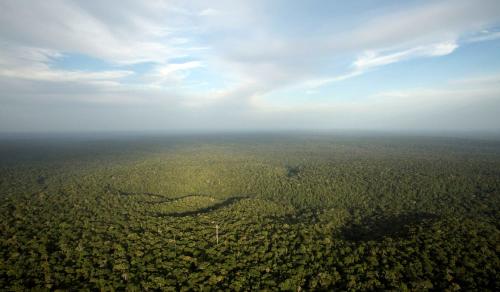By CGTN’s Lucrecia Franco
Amid political unrest, Brazilian campaigners say the days of the current government but also the Amazon could be numbered as the country’s congress debates removing protective measures from nearly 600,000 hectares of the rainforest.
Known as the “lungs of the world,” the Amazon produces 20 percent of the Earth’s oxygen. But deforestation has jumped 30 percent in a year.
Mass clearing of trees for cattle grazing and agriculture could reverse all the progress Brazil made in cutting carbon emissions in the last decade.
Data published in US scientific journalScienceshowed that Brazil slashed the amount of deforestation by 72 percent between 2004 and 2016.
However, the latest report from the Brazilian agency that monitors deforestation was gloomy. Between July 2015 and August 2016 loggers cleared over 7,900 square kilometers of Brazilian rainforest, an area nearly the size of Puerto Rico.

A view is seen from the Amazon Tall Tower Observatory (ATTO) in Sao Sebastiao do Uatuma in the middle of the Amazon forest in Amazonas State, Brazil, January 10, 2015. /VCG Photo
Critics argue that Brazil needs to urgently halt deforestation to help the planet. “At least half of Brazil’s carbon emissions come from deforestation. So if we stop deforestation here in Brazil that would be a major contribution to reduce carbon emissions – not only in the country but also [worldwide],” said Fabio Rubio Scarano, head of the Brazilian Foundation for Sustainable Development.
Non-profit groups warn that rainforests could completely vanish in 100 years if current deforestation rates continue.
“The issue is that there is a number of scientific evidence and models that indicate that if the Amazonia deforestation goes beyond 20 to 30 percent of the total area, this might drive the Amazonia to a tipping point that would be a point of change where the whole biosphere could perhaps turn into savanna, becoming drier, and if that happens this is going to have a major effect on global climate,” said Scarano.
Brazil had promised to reduce carbon emissions up to 43 percent by 2030, but instead it grew by 3.5 percent in 2015, according to the Climate Observatory, a group of Brazil’s top environmental NGOs.